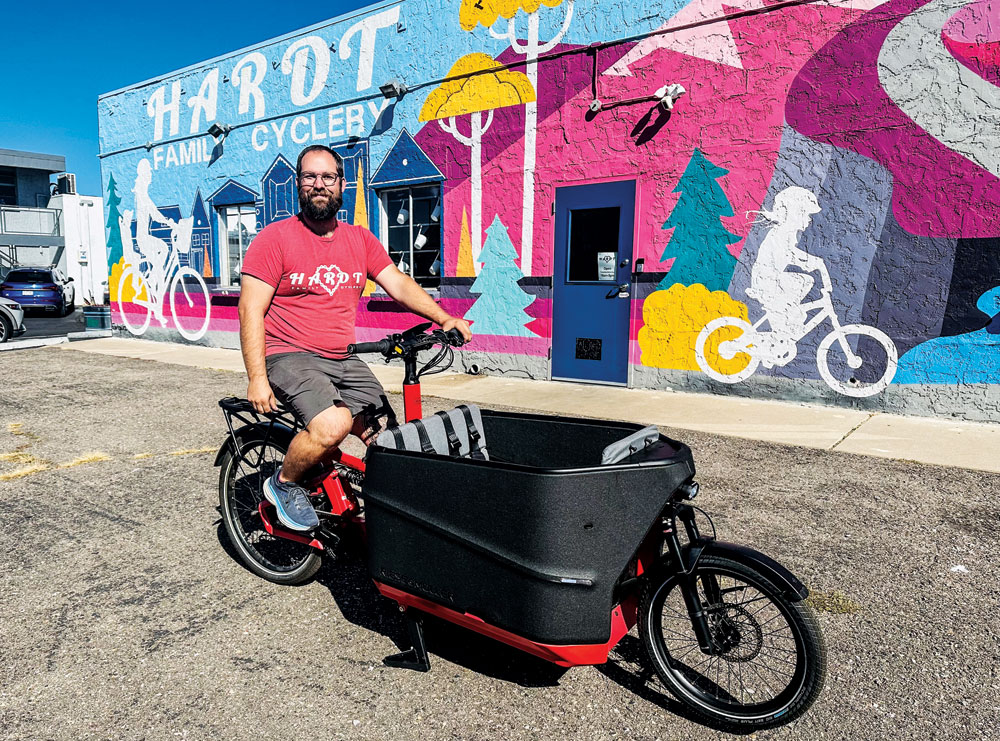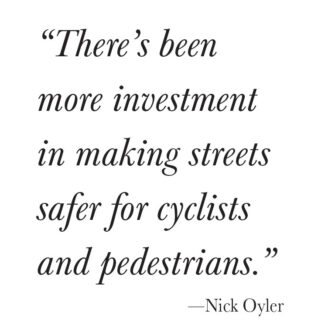
Central Park resident Nick Oyler uses his electric cargo bike to take his two children to school and then commute to work. A transportation consultant, Oyler says Denver is going to continue to see a huge increase in the use of electric bikes.
They seem to be everywhere: electric bikes of all shapes and sizes speeding along roads, bike lanes, and shared pedestrian pathways. Some look like regular bikes, some like small motorcycles, and still others appear as strange contraptions with pedals, handlebars, and enormous cargo platforms in front or back that are designed to carry children, groceries, and packages. The e-bike revolution has firmly taken hold in Denver, to the delight of many who want to see fewer gas-guzzling cars on the road and to the consternation of some pedestrians who worry about safety on pathways.

MacKenzie Hardt owns a cargo e-bike store and repair shop in Northwest Aurora and leads families on monthly bike rides throughout the city.
Central Park resident Nick Oyler is a bige-biking proponent—for health and climate benefits but also because it’s more fun. On most mornings, he uses his cargo e-bike to drop his two children off at school. “They love seeing the world from the back of the bike. They make many more observations than when they’re riding in a car.” For Oyler, e-bike commuting is more than a personal passion—it’s also his profession. He works for Toole Design Group, a planning and engineering company that advises cities (including Denver) about how to encourage more human-centered transportation, such as walking, biking, or public transit. Prior to moving to Denver last spring, he was the bicycle and pedestrian manager for Memphis.
 Oyler says he first became interested in encouraging cities to provide more bicycle-friendly infrastructure during college, when he studied in Europe and saw how those urban areas were better equipped for safe bicycle commuting. “I was captivated by what I saw and realized I wanted to work in a career that helped cities become safer for commuters.” He says Denver is like most American cities—fairly car-centric—but says that officials are working to change that. “There’s been more investment in making streets safer for cyclists and pedestrians. More needs to be done, but Denver is moving in the right direction.” Oyler says the growth in e-bike use will continue to dramatically rise in the coming years and predicts Denver will soon see a substantial increase in the number of e-bikes that are used for food and package delivery. He says it’s already commonplace in New York City to see Amazon deliveries done by cyclists with large cargo trailers.
Oyler says he first became interested in encouraging cities to provide more bicycle-friendly infrastructure during college, when he studied in Europe and saw how those urban areas were better equipped for safe bicycle commuting. “I was captivated by what I saw and realized I wanted to work in a career that helped cities become safer for commuters.” He says Denver is like most American cities—fairly car-centric—but says that officials are working to change that. “There’s been more investment in making streets safer for cyclists and pedestrians. More needs to be done, but Denver is moving in the right direction.” Oyler says the growth in e-bike use will continue to dramatically rise in the coming years and predicts Denver will soon see a substantial increase in the number of e-bikes that are used for food and package delivery. He says it’s already commonplace in New York City to see Amazon deliveries done by cyclists with large cargo trailers.
MacKenzie Hardt agrees that e-bikes will become even more ubiquitous—and that the city must do more to accommodate them. He says it’s a chicken and egg problem. “City governments don’t want to spend money on infrastructure unless they see there’s enough users, but people don’t want to ride bikes on busy streets if they think they’ll die. The e-bike rebate program has helped promote more e-bicycle use, but now we have this huge egg that’s starting to hatch and we have to deal with it,” says Hardt.
Hardt owns Hardt Family Cyclery in Northwest Aurora and has helped advise city and state officials about their e-bike rebate programs. The Denver rebate program started in April 2022 and has given out more than 7,000 rebates totaling more than $6.5 million. Mike Salisbury, who leads the city’s Office of Climate Action, Sustainability, and Resiliency, says the program has been “wildly successful and has greatly exceeded our expectations.” According to a survey by his office, Denver cyclists are replacing 3.4 vehicle trips every week with e-bike trips, which totals about 150,000 vehicle miles avoided per week. Salisbury says that “significantly reduces greenhouse gas emissions from the transportation sector.”
A second rebate program implemented by the state of Colorado was launched in August. It is geared exclusively for low-to-moderate income households and will spend
$6.6 million over the next six months with the goal of helping 7,000 people buy e-bikes.
To meet the burgeoning e-bike use, Salisbury says that Denver has installed 137 miles of bike lanes over the last five years and will continue to add more. Still, some Denver pedestrians worry that these faster bikes pose a danger to walkers and joggers on shared pathways.
Hardt says he thinks that Denver has good laws governing e-bike use, but that not enough people know or follow the rules. “Our bike paths do have speed limits. There are restrictions on what bikes can ride on different paths. Bikes with throttles are not supposed to be on any kind of path—they’re supposed to be on the road. But not everyone follows the rules.” He wishes that there was a better system of educating young and old cyclists alike, and concedes that the current 15 mph speed limit on pathways should probably be lowered to 10 mph. Still, he says it comes down to courtesy. “We could prevent most problems and injuries if more people used common sense and courtesy when interacting with others on these paths.” Improving biker education is one of the reasons Hardt leads monthly family bike rides designed to show families how to safely navigate Denver streets. “Our rides typically connect two or three neighborhoods. We’ll go from playground to playground or stop at coffee or ice cream shops along the way. We are teaching safety but we also have a lot of fun.”
For more information about the family bike rides, visit www.hardtfamilycyclery.com. For information about Denver’s e-bike rebate program visit www.denvergov.org and for Colorado’s rebate program, email ebikescolorado@aptim.com.
Front Porch photos by Christie Gosch


0 Comments